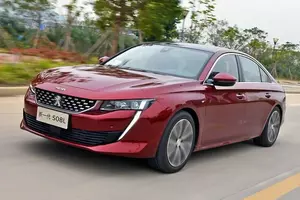
| Vehicle | Curb weight | Difference from world's smallest | Weight to power ratio | 0—60 mph acceleration ratio | Consumption ratio |
|---|---|---|---|---|---|
| 350 THP PureTech |
1478 kg / 3259 lbs |
1053 kg (2322 lbs) heavier | 9 kg to 1 hp | - |
235 kg/L (518 lbs/L) |
| 400 THP PureTech |
1538 kg / 3391 lbs |
1113 kg (2454 lbs) heavier | 7 kg to 1 hp | - |
252 kg/L (556 lbs/L) |
| 360 THP PureTech |
1490 kg / 3285 lbs |
1065 kg (2348 lbs) heavier | 9 kg to 1 hp | - |
248 kg/L (547 lbs/L) |
| Vehicle | 350 THP PureTech |
|---|---|
| Curb weight |
1478 kg / 3259 lbs |
| Difference from world's smallest | 1053 kg (1053 lbs) heavier |
| Weight to power ratio | 9 kg to 1 hp |
| 0—60 mph acceleration ratio | - |
| Consumption ratio |
235 kg/L (518 lbs/L) |
| Vehicle | 400 THP PureTech |
| Curb weight |
1538 kg / 3391 lbs |
| Difference from world's smallest | 1113 kg (1113 lbs) heavier |
| Weight to power ratio | 7 kg to 1 hp |
| 0—60 mph acceleration ratio | - |
| Consumption ratio |
252 kg/L (556 lbs/L) |
| Vehicle | 360 THP PureTech |
| Curb weight |
1490 kg / 3285 lbs |
| Difference from world's smallest | 1065 kg (1065 lbs) heavier |
| Weight to power ratio | 9 kg to 1 hp |
| 0—60 mph acceleration ratio | - |
| Consumption ratio |
248 kg/L (547 lbs/L) |
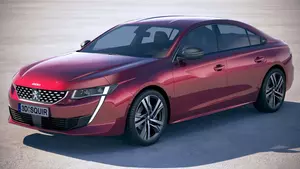
| Vehicle | Curb weight | Difference from world's smallest | Weight to power ratio | 0—60 mph acceleration ratio | Consumption ratio |
|---|---|---|---|---|---|
| 1.6 PureTech |
1420 kg / 3131 lbs |
995 kg (2194 lbs) heavier | 8 kg to 1 hp | 189 kg/s (417 lbs/s) |
263 kg/L (580 lbs/L) |
| GT 1.6 PureTech |
1420 kg / 3131 lbs |
995 kg (2194 lbs) heavier | 6 kg to 1 hp | 206 kg/s (454 lbs/s) |
254 kg/L (560 lbs/L) |
| 1.5 BlueHDi |
1420 kg / 3131 lbs |
995 kg (2194 lbs) heavier | 11 kg to 1 hp | 149 kg/s (329 lbs/s) |
384 kg/L (847 lbs/L) |
| 2.0 BlueHDi |
1530 kg / 3374 lbs |
1105 kg (2437 lbs) heavier | 10 kg to 1 hp | 191 kg/s (421 lbs/s) |
340 kg/L (750 lbs/L) |
| Vehicle | 1.6 PureTech |
|---|---|
| Curb weight |
1420 kg / 3131 lbs |
| Difference from world's smallest | 995 kg (995 lbs) heavier |
| Weight to power ratio | 8 kg to 1 hp |
| 0—60 mph acceleration ratio | 189 kg/s (417 lbs/s) |
| Consumption ratio |
263 kg/L (580 lbs/L) |
| Vehicle | GT 1.6 PureTech |
| Curb weight |
1420 kg / 3131 lbs |
| Difference from world's smallest | 995 kg (995 lbs) heavier |
| Weight to power ratio | 6 kg to 1 hp |
| 0—60 mph acceleration ratio | 206 kg/s (454 lbs/s) |
| Consumption ratio |
254 kg/L (560 lbs/L) |
| Vehicle | 1.5 BlueHDi |
| Curb weight |
1420 kg / 3131 lbs |
| Difference from world's smallest | 995 kg (995 lbs) heavier |
| Weight to power ratio | 11 kg to 1 hp |
| 0—60 mph acceleration ratio | 149 kg/s (329 lbs/s) |
| Consumption ratio |
384 kg/L (847 lbs/L) |
| Vehicle | 2.0 BlueHDi |
| Curb weight |
1530 kg / 3374 lbs |
| Difference from world's smallest | 1105 kg (1105 lbs) heavier |
| Weight to power ratio | 10 kg to 1 hp |
| 0—60 mph acceleration ratio | 191 kg/s (421 lbs/s) |
| Consumption ratio |
340 kg/L (750 lbs/L) |
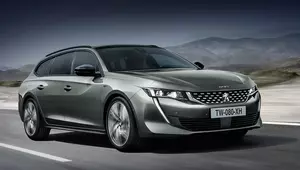
| Vehicle | Curb weight | Difference from world's smallest | Weight to power ratio | 0—60 mph acceleration ratio | Consumption ratio |
|---|---|---|---|---|---|
| GT 1.6 PureTech |
1430 kg / 3153 lbs |
1005 kg (2216 lbs) heavier | 6 kg to 1 hp | 204 kg/s (450 lbs/s) |
251 kg/L (553 lbs/L) |
| 2.0 BlueHDi |
1540 kg / 3396 lbs |
1115 kg (2459 lbs) heavier | 10 kg to 1 hp | 190 kg/s (419 lbs/s) |
342 kg/L (754 lbs/L) |
| 1.5 BlueHDi |
1430 kg / 3153 lbs |
1005 kg (2216 lbs) heavier | 11 kg to 1 hp | 149 kg/s (329 lbs/s) |
386 kg/L (851 lbs/L) |
| 1.6 PureTech |
1430 kg / 3153 lbs |
1005 kg (2216 lbs) heavier | 8 kg to 1 hp | 188 kg/s (415 lbs/s) |
265 kg/L (584 lbs/L) |
| Vehicle | GT 1.6 PureTech |
|---|---|
| Curb weight |
1430 kg / 3153 lbs |
| Difference from world's smallest | 1005 kg (1005 lbs) heavier |
| Weight to power ratio | 6 kg to 1 hp |
| 0—60 mph acceleration ratio | 204 kg/s (450 lbs/s) |
| Consumption ratio |
251 kg/L (553 lbs/L) |
| Vehicle | 2.0 BlueHDi |
| Curb weight |
1540 kg / 3396 lbs |
| Difference from world's smallest | 1115 kg (1115 lbs) heavier |
| Weight to power ratio | 10 kg to 1 hp |
| 0—60 mph acceleration ratio | 190 kg/s (419 lbs/s) |
| Consumption ratio |
342 kg/L (754 lbs/L) |
| Vehicle | 1.5 BlueHDi |
| Curb weight |
1430 kg / 3153 lbs |
| Difference from world's smallest | 1005 kg (1005 lbs) heavier |
| Weight to power ratio | 11 kg to 1 hp |
| 0—60 mph acceleration ratio | 149 kg/s (329 lbs/s) |
| Consumption ratio |
386 kg/L (851 lbs/L) |
| Vehicle | 1.6 PureTech |
| Curb weight |
1430 kg / 3153 lbs |
| Difference from world's smallest | 1005 kg (1005 lbs) heavier |
| Weight to power ratio | 8 kg to 1 hp |
| 0—60 mph acceleration ratio | 188 kg/s (415 lbs/s) |
| Consumption ratio |
265 kg/L (584 lbs/L) |
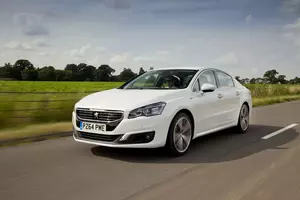
| Vehicle | Curb weight | Difference from world's smallest | Weight to power ratio | 0—60 mph acceleration ratio | Consumption ratio |
|---|---|---|---|---|---|
| 1.6 THP |
1410 kg / 3109 lbs |
985 kg (2172 lbs) heavier | 9 kg to 1 hp | 166 kg/s (366 lbs/s) |
243 kg/L (536 lbs/L) |
| 1.6 VTi |
1390 kg / 3065 lbs |
965 kg (2128 lbs) heavier | 12 kg to 1 hp | 128 kg/s (282 lbs/s) |
240 kg/L (529 lbs/L) |
| 1.6 e-HDi |
1410 kg / 3109 lbs |
985 kg (2172 lbs) heavier | 12 kg to 1 hp | 125 kg/s (276 lbs/s) |
353 kg/L (778 lbs/L) |
| 2.0 HDi |
1520 kg / 3352 lbs |
1095 kg (2415 lbs) heavier | 9 kg to 1 hp | 175 kg/s (386 lbs/s) |
281 kg/L (620 lbs/L) |
| 2.0 BlueHDi |
1500 kg / 3308 lbs |
1075 kg (2371 lbs) heavier | 10 kg to 1 hp | 176 kg/s (388 lbs/s) |
366 kg/L (807 lbs/L) |
| 2.2 HDi |
1540 kg / 3396 lbs |
1115 kg (2459 lbs) heavier | 8 kg to 1 hp | 197 kg/s (434 lbs/s) |
291 kg/L (642 lbs/L) |
| 1.6 BlueHDI |
1629 kg / 3592 lbs |
1204 kg (2655 lbs) heavier | 14 kg to 1 hp | 155 kg/s (342 lbs/s) |
418 kg/L (922 lbs/L) |
| Vehicle | 1.6 THP |
|---|---|
| Curb weight |
1410 kg / 3109 lbs |
| Difference from world's smallest | 985 kg (985 lbs) heavier |
| Weight to power ratio | 9 kg to 1 hp |
| 0—60 mph acceleration ratio | 166 kg/s (366 lbs/s) |
| Consumption ratio |
243 kg/L (536 lbs/L) |
| Vehicle | 1.6 VTi |
| Curb weight |
1390 kg / 3065 lbs |
| Difference from world's smallest | 965 kg (965 lbs) heavier |
| Weight to power ratio | 12 kg to 1 hp |
| 0—60 mph acceleration ratio | 128 kg/s (282 lbs/s) |
| Consumption ratio |
240 kg/L (529 lbs/L) |
| Vehicle | 1.6 e-HDi |
| Curb weight |
1410 kg / 3109 lbs |
| Difference from world's smallest | 985 kg (985 lbs) heavier |
| Weight to power ratio | 12 kg to 1 hp |
| 0—60 mph acceleration ratio | 125 kg/s (276 lbs/s) |
| Consumption ratio |
353 kg/L (778 lbs/L) |
| Vehicle | 2.0 HDi |
| Curb weight |
1520 kg / 3352 lbs |
| Difference from world's smallest | 1095 kg (1095 lbs) heavier |
| Weight to power ratio | 9 kg to 1 hp |
| 0—60 mph acceleration ratio | 175 kg/s (386 lbs/s) |
| Consumption ratio |
281 kg/L (620 lbs/L) |
| Vehicle | 2.0 BlueHDi |
| Curb weight |
1500 kg / 3308 lbs |
| Difference from world's smallest | 1075 kg (1075 lbs) heavier |
| Weight to power ratio | 10 kg to 1 hp |
| 0—60 mph acceleration ratio | 176 kg/s (388 lbs/s) |
| Consumption ratio |
366 kg/L (807 lbs/L) |
| Vehicle | 2.2 HDi |
| Curb weight |
1540 kg / 3396 lbs |
| Difference from world's smallest | 1115 kg (1115 lbs) heavier |
| Weight to power ratio | 8 kg to 1 hp |
| 0—60 mph acceleration ratio | 197 kg/s (434 lbs/s) |
| Consumption ratio |
291 kg/L (642 lbs/L) |
| Vehicle | 1.6 BlueHDI |
| Curb weight |
1629 kg / 3592 lbs |
| Difference from world's smallest | 1204 kg (1204 lbs) heavier |
| Weight to power ratio | 14 kg to 1 hp |
| 0—60 mph acceleration ratio | 155 kg/s (342 lbs/s) |
| Consumption ratio |
418 kg/L (922 lbs/L) |
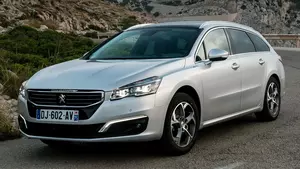
| Vehicle | Curb weight | Difference from world's smallest | Weight to power ratio | 0—60 mph acceleration ratio | Consumption ratio |
|---|---|---|---|---|---|
| 1.6 VTi |
1410 kg / 3109 lbs |
985 kg (2172 lbs) heavier | 12 kg to 1 hp | 126 kg/s (278 lbs/s) |
243 kg/L (536 lbs/L) |
| 1.6 e-HDI |
1430 kg / 3153 lbs |
1005 kg (2216 lbs) heavier | 12 kg to 1 hp | 122 kg/s (269 lbs/s) |
358 kg/L (789 lbs/L) |
| 2.0 HDi |
1540 kg / 3396 lbs |
1115 kg (2459 lbs) heavier | 9 kg to 1 hp | 171 kg/s (377 lbs/s) |
280 kg/L (617 lbs/L) |
| 1.6 THP |
1430 kg / 3153 lbs |
1005 kg (2216 lbs) heavier | 9 kg to 1 hp | 166 kg/s (366 lbs/s) |
247 kg/L (545 lbs/L) |
| 2.2 HDi |
1660 kg / 3660 lbs |
1235 kg (2723 lbs) heavier | 8 kg to 1 hp | 208 kg/s (459 lbs/s) |
302 kg/L (666 lbs/L) |
| 2.0 BlueHDi |
1520 kg / 3352 lbs |
1095 kg (2415 lbs) heavier | 10 kg to 1 hp | 177 kg/s (390 lbs/s) |
362 kg/L (798 lbs/L) |
| 1.6 BlueHDI |
1651 kg / 3640 lbs |
1226 kg (2703 lbs) heavier | 14 kg to 1 hp | 154 kg/s (340 lbs/s) |
393 kg/L (867 lbs/L) |
| Vehicle | 1.6 VTi |
|---|---|
| Curb weight |
1410 kg / 3109 lbs |
| Difference from world's smallest | 985 kg (985 lbs) heavier |
| Weight to power ratio | 12 kg to 1 hp |
| 0—60 mph acceleration ratio | 126 kg/s (278 lbs/s) |
| Consumption ratio |
243 kg/L (536 lbs/L) |
| Vehicle | 1.6 e-HDI |
| Curb weight |
1430 kg / 3153 lbs |
| Difference from world's smallest | 1005 kg (1005 lbs) heavier |
| Weight to power ratio | 12 kg to 1 hp |
| 0—60 mph acceleration ratio | 122 kg/s (269 lbs/s) |
| Consumption ratio |
358 kg/L (789 lbs/L) |
| Vehicle | 2.0 HDi |
| Curb weight |
1540 kg / 3396 lbs |
| Difference from world's smallest | 1115 kg (1115 lbs) heavier |
| Weight to power ratio | 9 kg to 1 hp |
| 0—60 mph acceleration ratio | 171 kg/s (377 lbs/s) |
| Consumption ratio |
280 kg/L (617 lbs/L) |
| Vehicle | 1.6 THP |
| Curb weight |
1430 kg / 3153 lbs |
| Difference from world's smallest | 1005 kg (1005 lbs) heavier |
| Weight to power ratio | 9 kg to 1 hp |
| 0—60 mph acceleration ratio | 166 kg/s (366 lbs/s) |
| Consumption ratio |
247 kg/L (545 lbs/L) |
| Vehicle | 2.2 HDi |
| Curb weight |
1660 kg / 3660 lbs |
| Difference from world's smallest | 1235 kg (1235 lbs) heavier |
| Weight to power ratio | 8 kg to 1 hp |
| 0—60 mph acceleration ratio | 208 kg/s (459 lbs/s) |
| Consumption ratio |
302 kg/L (666 lbs/L) |
| Vehicle | 2.0 BlueHDi |
| Curb weight |
1520 kg / 3352 lbs |
| Difference from world's smallest | 1095 kg (1095 lbs) heavier |
| Weight to power ratio | 10 kg to 1 hp |
| 0—60 mph acceleration ratio | 177 kg/s (390 lbs/s) |
| Consumption ratio |
362 kg/L (798 lbs/L) |
| Vehicle | 1.6 BlueHDI |
| Curb weight |
1651 kg / 3640 lbs |
| Difference from world's smallest | 1226 kg (1226 lbs) heavier |
| Weight to power ratio | 14 kg to 1 hp |
| 0—60 mph acceleration ratio | 154 kg/s (340 lbs/s) |
| Consumption ratio |
393 kg/L (867 lbs/L) |
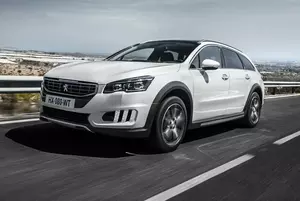
| Vehicle | Curb weight | Difference from world's smallest | Weight to power ratio | 0—60 mph acceleration ratio | Consumption ratio |
|---|---|---|---|---|---|
| 2.0 HDi |
1770 kg / 3903 lbs |
1345 kg (2966 lbs) heavier | 11 kg to 1 hp | 211 kg/s (465 lbs/s) |
443 kg/L (977 lbs/L) |
| 2.0 BlueHDi |
1717 kg / 3786 lbs |
1292 kg (2849 lbs) heavier | 10 kg to 1 hp | 202 kg/s (445 lbs/s) |
373 kg/L (822 lbs/L) |
| Vehicle | 2.0 HDi |
|---|---|
| Curb weight |
1770 kg / 3903 lbs |
| Difference from world's smallest | 1345 kg (1345 lbs) heavier |
| Weight to power ratio | 11 kg to 1 hp |
| 0—60 mph acceleration ratio | 211 kg/s (465 lbs/s) |
| Consumption ratio |
443 kg/L (977 lbs/L) |
| Vehicle | 2.0 BlueHDi |
| Curb weight |
1717 kg / 3786 lbs |
| Difference from world's smallest | 1292 kg (1292 lbs) heavier |
| Weight to power ratio | 10 kg to 1 hp |
| 0—60 mph acceleration ratio | 202 kg/s (445 lbs/s) |
| Consumption ratio |
373 kg/L (822 lbs/L) |
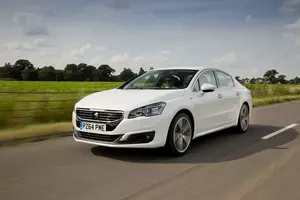
| Vehicle | Curb weight | Difference from world's smallest | Weight to power ratio | 0—60 mph acceleration ratio | Consumption ratio |
|---|---|---|---|---|---|
| 1.6 VTi |
1390 kg / 3065 lbs |
965 kg (2128 lbs) heavier | 12 kg to 1 hp | 128 kg/s (282 lbs/s) |
224 kg/L (494 lbs/L) |
| 1.6 THP |
1410 kg / 3109 lbs |
985 kg (2172 lbs) heavier | 9 kg to 1 hp | 162 kg/s (357 lbs/s) |
199 kg/L (439 lbs/L) |
| 1.6 e-HDI |
1410 kg / 3109 lbs |
985 kg (2172 lbs) heavier | 12 kg to 1 hp | 125 kg/s (276 lbs/s) |
320 kg/L (706 lbs/L) |
| 1.6 HDI |
1405 kg / 3098 lbs |
980 kg (2161 lbs) heavier | 12 kg to 1 hp | 131 kg/s (289 lbs/s) |
299 kg/L (659 lbs/L) |
| 2.0 HDI |
1520 kg / 3352 lbs |
1095 kg (2415 lbs) heavier | 9 kg to 1 hp | 175 kg/s (386 lbs/s) |
267 kg/L (589 lbs/L) |
| 2.2 HDI |
1540 kg / 3396 lbs |
1115 kg (2459 lbs) heavier | 8 kg to 1 hp | 197 kg/s (434 lbs/s) |
270 kg/L (595 lbs/L) |
| 2.0 HDi |
1660 kg / 3660 lbs |
1235 kg (2723 lbs) heavier | 10 kg to 1 hp | 202 kg/s (445 lbs/s) |
461 kg/L (1017 lbs/L) |
| Vehicle | 1.6 VTi |
|---|---|
| Curb weight |
1390 kg / 3065 lbs |
| Difference from world's smallest | 965 kg (965 lbs) heavier |
| Weight to power ratio | 12 kg to 1 hp |
| 0—60 mph acceleration ratio | 128 kg/s (282 lbs/s) |
| Consumption ratio |
224 kg/L (494 lbs/L) |
| Vehicle | 1.6 THP |
| Curb weight |
1410 kg / 3109 lbs |
| Difference from world's smallest | 985 kg (985 lbs) heavier |
| Weight to power ratio | 9 kg to 1 hp |
| 0—60 mph acceleration ratio | 162 kg/s (357 lbs/s) |
| Consumption ratio |
199 kg/L (439 lbs/L) |
| Vehicle | 1.6 e-HDI |
| Curb weight |
1410 kg / 3109 lbs |
| Difference from world's smallest | 985 kg (985 lbs) heavier |
| Weight to power ratio | 12 kg to 1 hp |
| 0—60 mph acceleration ratio | 125 kg/s (276 lbs/s) |
| Consumption ratio |
320 kg/L (706 lbs/L) |
| Vehicle | 1.6 HDI |
| Curb weight |
1405 kg / 3098 lbs |
| Difference from world's smallest | 980 kg (980 lbs) heavier |
| Weight to power ratio | 12 kg to 1 hp |
| 0—60 mph acceleration ratio | 131 kg/s (289 lbs/s) |
| Consumption ratio |
299 kg/L (659 lbs/L) |
| Vehicle | 2.0 HDI |
| Curb weight |
1520 kg / 3352 lbs |
| Difference from world's smallest | 1095 kg (1095 lbs) heavier |
| Weight to power ratio | 9 kg to 1 hp |
| 0—60 mph acceleration ratio | 175 kg/s (386 lbs/s) |
| Consumption ratio |
267 kg/L (589 lbs/L) |
| Vehicle | 2.2 HDI |
| Curb weight |
1540 kg / 3396 lbs |
| Difference from world's smallest | 1115 kg (1115 lbs) heavier |
| Weight to power ratio | 8 kg to 1 hp |
| 0—60 mph acceleration ratio | 197 kg/s (434 lbs/s) |
| Consumption ratio |
270 kg/L (595 lbs/L) |
| Vehicle | 2.0 HDi |
| Curb weight |
1660 kg / 3660 lbs |
| Difference from world's smallest | 1235 kg (1235 lbs) heavier |
| Weight to power ratio | 10 kg to 1 hp |
| 0—60 mph acceleration ratio | 202 kg/s (445 lbs/s) |
| Consumption ratio |
461 kg/L (1017 lbs/L) |

| Vehicle | Curb weight | Difference from world's smallest | Weight to power ratio | 0—60 mph acceleration ratio | Consumption ratio |
|---|---|---|---|---|---|
| 2.0 HDI |
1770 kg / 3903 lbs |
1345 kg (2966 lbs) heavier | 11 kg to 1 hp | 190 kg/s (419 lbs/s) |
432 kg/L (953 lbs/L) |
| Vehicle | 2.0 HDI |
|---|---|
| Curb weight |
1770 kg / 3903 lbs |
| Difference from world's smallest | 1345 kg (1345 lbs) heavier |
| Weight to power ratio | 11 kg to 1 hp |
| 0—60 mph acceleration ratio | 190 kg/s (419 lbs/s) |
| Consumption ratio |
432 kg/L (953 lbs/L) |
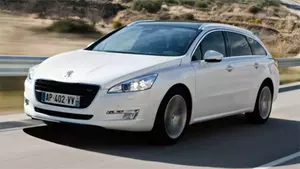
| Vehicle | Curb weight | Difference from world's smallest | Weight to power ratio | 0—60 mph acceleration ratio | Consumption ratio |
|---|---|---|---|---|---|
| 1.6 VTi |
1410 kg / 3109 lbs |
985 kg (2172 lbs) heavier | 12 kg to 1 hp | 126 kg/s (278 lbs/s) |
224 kg/L (494 lbs/L) |
| 1.6 THP |
1420 kg / 3131 lbs |
995 kg (2194 lbs) heavier | 9 kg to 1 hp | 169 kg/s (373 lbs/s) |
218 kg/L (481 lbs/L) |
| 1.6 HDI |
1425 kg / 3142 lbs |
1000 kg (2205 lbs) heavier | 12 kg to 1 hp | 130 kg/s (287 lbs/s) |
297 kg/L (655 lbs/L) |
| 2.0 HDI |
1540 kg / 3396 lbs |
1115 kg (2459 lbs) heavier | 9 kg to 1 hp | 171 kg/s (377 lbs/s) |
270 kg/L (595 lbs/L) |
| 1.6 e-HDI |
1430 kg / 3153 lbs |
1005 kg (2216 lbs) heavier | 12 kg to 1 hp | 122 kg/s (269 lbs/s) |
318 kg/L (701 lbs/L) |
| 2.2 HDI |
1660 kg / 3660 lbs |
1235 kg (2723 lbs) heavier | 8 kg to 1 hp | 208 kg/s (459 lbs/s) |
281 kg/L (620 lbs/L) |
| Vehicle | 1.6 VTi |
|---|---|
| Curb weight |
1410 kg / 3109 lbs |
| Difference from world's smallest | 985 kg (985 lbs) heavier |
| Weight to power ratio | 12 kg to 1 hp |
| 0—60 mph acceleration ratio | 126 kg/s (278 lbs/s) |
| Consumption ratio |
224 kg/L (494 lbs/L) |
| Vehicle | 1.6 THP |
| Curb weight |
1420 kg / 3131 lbs |
| Difference from world's smallest | 995 kg (995 lbs) heavier |
| Weight to power ratio | 9 kg to 1 hp |
| 0—60 mph acceleration ratio | 169 kg/s (373 lbs/s) |
| Consumption ratio |
218 kg/L (481 lbs/L) |
| Vehicle | 1.6 HDI |
| Curb weight |
1425 kg / 3142 lbs |
| Difference from world's smallest | 1000 kg (1000 lbs) heavier |
| Weight to power ratio | 12 kg to 1 hp |
| 0—60 mph acceleration ratio | 130 kg/s (287 lbs/s) |
| Consumption ratio |
297 kg/L (655 lbs/L) |
| Vehicle | 2.0 HDI |
| Curb weight |
1540 kg / 3396 lbs |
| Difference from world's smallest | 1115 kg (1115 lbs) heavier |
| Weight to power ratio | 9 kg to 1 hp |
| 0—60 mph acceleration ratio | 171 kg/s (377 lbs/s) |
| Consumption ratio |
270 kg/L (595 lbs/L) |
| Vehicle | 1.6 e-HDI |
| Curb weight |
1430 kg / 3153 lbs |
| Difference from world's smallest | 1005 kg (1005 lbs) heavier |
| Weight to power ratio | 12 kg to 1 hp |
| 0—60 mph acceleration ratio | 122 kg/s (269 lbs/s) |
| Consumption ratio |
318 kg/L (701 lbs/L) |
| Vehicle | 2.2 HDI |
| Curb weight |
1660 kg / 3660 lbs |
| Difference from world's smallest | 1235 kg (1235 lbs) heavier |
| Weight to power ratio | 8 kg to 1 hp |
| 0—60 mph acceleration ratio | 208 kg/s (459 lbs/s) |
| Consumption ratio |
281 kg/L (620 lbs/L) |